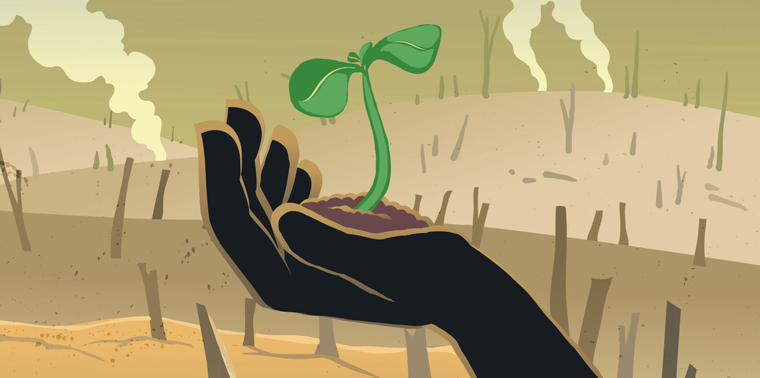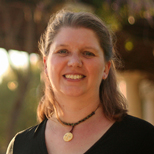September 19, 2017 — The damage climate change does in terms of loss of life, health and property has been under the microscope of researchers for many years. Only recently, however, have the mental health impacts of climate change, including the impacts on people working in climate change research, policy and related fields, been subjected to scrutiny. The award-winning biologist Camille Parmesan described becoming “professionally depressed” as a result of her research on climate change in a 2014 Grist interview. Previously, she was quoted in a 2012 National Wildlife Federation report on the mental health impacts of climate change on scientists: “I don’t know of a single scientist that’s not having an emotional reaction to what is being lost. Some of these people have been studying a particular reef or a particular bird or a particular mammal for 40 to 50 years. And to start seeing it die off is a very hard thing.” Referring to an ocean reef she has studied since 2002, she added, “It’s gotten to be so depressing that I’m not sure I’m going to go back to this particular site again, because I just know I’m going to see more and more of it dead, and bleached, and covered with brown algae.”
People whose work is related to climate change need to recognize that they are susceptible to a special kind of stress due to the overwhelming nature of the problem. Such work can lead to psychological trauma, shattering our deeply held assumptions and beliefs about the way the world works and our role in it. This in turn can lead to burnout and disengagement.
To protect ourselves and our communities and maintain our capacity to continue to address climate change, we need to understand, recognize and respond to climate trauma.
What Climate Trauma Looks Like
Climate trauma is a term coined by filmmaker and social justice advocate Gillian Caldwell in a 2009 blog post “Coming out of the closet: My climate trauma (and yours?).” It is used to encompass toxic stress and psychological trauma from living with the consequences of climate change as well as the knowledge of those consequences. For individuals, it can come in acute and chronic forms, per a 2017 report from the American Psychological Association and ecoAmerica, “Mental Health and Our Changing Climate: Impacts, Implications, and Guidance”:
Acute:
- Trauma and shock
- Post-traumatic stress disorder
- Compounded stress (e.g., when climate trauma exacerbates other stress-related problems, such as substance abuse, anxiety disorders, and depression, or when natural disasters lead to increased risky behavior)
- Impact on physical health
- Strains on social relationships
Chronic:
- Aggression and violence
- Mental health emergencies
- Loss of personally important places
- Loss of autonomy and control
- Loss of personal and occupational identity
- “Ecoanxiety” (concern for the well-being of current and future generations in the face of climate change)
Evidence of climate trauma can be found on the website Is This How You Feel?, which provides a forum for climate scientists to share their feelings about climate change. Comments posted to the site include words and phrases like “dismayed,” “powerless” and “overwhelmed.” One contributor writes of his concern that “we will leave behind a fundamentally degraded planet for our children.” Another writes, “My overwhelming emotion is anger.”
What Can Individuals Do?
The 2017 ecoAmerica report offers these suggestions for addressing climate trauma at an individual level:
- “Build belief in one’s own resilience.”
- “Foster optimism.”
- “Cultivate active coping and self-regulation”
- “Maintain practices that help to provide a sense of meaning.”
- “Promote connectedness to family, place, culture, and community.”
Bob Doppelt, director of The Resource Innovation Group, recommends building presencing and purposing skills to cope with climate trauma. These include:
- Stabilize your nervous system by centering yourself (e.g., use meditation to lower “fight-or-flight” hormones triggered by stress).
- Take stock of your personal skills and internal and external resources.
- Observe your reactions and thoughts without judgment and with compassion for yourself.
- Notice moments of growth, insight and new meaning.
- Remember the values you want to live by.
- Find hope by making choices that increase the well-being of yourself, others and the environment.
- Help others.
Other suggestions from climate professionals gathered at a session on climate trauma I organized and co-led at the National Adaptation Forum in May 2017 include:
- Release the need to be right.
- Stay offline after work.
- Talk to and hug friends.
- Cultivate a sense of humor.
- Walk dogs for the Humane Society.
- Adopt a contemplative practice.
- Participate in outdoor activities like gardening and hiking.
- Practice yoga.
- Sleep.
Caldwell’s suggestions, based on the advice of forensic psychiatrist Lise Van Susteren, one of the co-authors of the 2012 National Wildlife Federation report cited above, include:
- Take care of yourself physically and spiritually.
- Remember that you are not alone.
- Participate in activities not related to climate.
- Reinforce boundaries between your work and personal life.
- Connect with colleagues without talking about climate.
- Remember that your fears are realistic but your expectations of yourself might not be.
- Don’t overwork.
- Don’t do climate-related work at night.
- Admit what you are going through.
- Recognize symptoms of burnout.
- Don’t give up.
What Can Organizations Do?
Climate trauma researchers have suggested ways to deal with the issue on an institutional scale as well. The 2012 National Wildlife Federation report suggests these organization-level responses:
- Create comprehensive plans and guidelines for mental health practitioners, first responders and primary care professionals for dealing with climate trauma, with priority given to training those who serve the most vulnerable populations.
- Work to better assess, diagnose and treat individuals with climate-related mental health problems.
- Estimate and compare the costs of addressing the psychological effects of climate change and ignoring the problem.
- Develop and deploy government mental health incident response teams.
- Develop helpful models for positive individual and community action (e.g., the “health belief model”).
- Factor the psychological implications of climate change into public policy development.
It also recommends that the mental health community help the public and leaders become aware of how climate change is affecting us and what we can do about it and advocate for protecting people from climate change.
Taking Care of Ourselves and Each Other
The discussion of climate trauma rose to a new level of intensity after the 2015 Esquire article “When the End of Human Civilization Is Your Day Job” presented the stories of several climate scientists coping with fear, despair and depression. Since then, the question of how to create a community of practice to support climate change workers dealing with climate trauma has been left largely unanswered. Particularly in the U.S., with its current political climate, this is a hard time to be working on climate change. In order to keep this good work moving forward and not burn out under the pressures of the current moment, those of us trying to address climate change in our day jobs need to be aware of the stress we face and do what we can take care of ourselves and each other.
Editor’s note: The views expressed here are those of the author and not necessarily of Ensia.
Ensia shares solutions-focused stories free of charge through our online magazine and partner media. That means audiences around the world have ready access to stories that can — and do — help them shape a better future. If you value our work, please show your support today.
Yes, I'll support Ensia!

You seem to have no idea how therapeutic peaceful direct action can be.
Thanks for a great article. Action helps. Divest.
Only now, it's our human family of 7 billion and the death rate is increasing while survivors try to carry on. Overwhelmed, we also see other species disappearing. A daunting challenge to help where we can. We avoid exclusionary melancholia by giving ourselves time to rest, meditate and survey the situation, then seek to join with others in common struggles.
All of my work up to that time time was focused on "Wall St" emission reduction strategies but I began to turn my thoughts toward "Main St" adaptation strategies. There is a long story of introspection, research and planning, but the short of is, I quit a great job and career on Oct 1, 2012 and founded a folk craft school.
My thought at the time was that one way I could contribute to avoiding a climate crises was to begin building economic activity around local craft which serves a practical purpose of providing useful and beautiful things we all need, and making them to the extent possible, out of locally sourced materials. The global economy felt fragile and we needed to become more self sufficient. I was not interested in "survivalist boot camp" but more like growing a learning community around practical life skills. Instead of fearing the future of change, I wanted to move joyfully and connectedly forward into the uncertain future.
I founded the school in the spring of 2013, we rented an old warehouse and we had our grand opening Oct 2013. We have programs in woodworking, metalworking, fiber arts, ceramics, stone carving and music. In the past 4 years, we have grown a 6 figure budget. We have generated income for our instructors, many of whom are now able to work full time in their craft with the supplemental income they make from teaching for us. We source all of our lumber within our county by small, certified sustainable family-run forest land-owners. We use local grasses and bark in our basket weaving classes. We use wool from local sheep and even dye material from locally gown dye materials.
I could go on all day with stories, but the point is, we are growing an economy just like we hoped. We are creating craft tourism. We are educating the public about the labor and skill involved in hand-made items. We are increasing access to handmade goods.
I don't expect everyone to stop shopping at Walmart and start buying artisan goods...but overtime whenever someone makes their own gift instead of purchasing something from Walmart, the economic needle moves a little further in our favor.
Yes, this may seem like a long way from making any difference to the climate, but it's a deeply joyful start. The community is absolutely clamoring for what we are offering. We are reaching people's souls in a profound way...something I didn't anticipate at all. And people from all political stripes participate - there is no environmental message in what we are doing.
These crafts served our hearts, communities, economy and our environment for millennia and our current one or two generations of fossil-fuel-enabled inattention are resulting in a huge loss of knowledge and skill.
I do miss working directly on climate issues, but I've had more than my share of talking about what to do. Now I'm very, very busy doing what feels right and good to me at this time. However, I think this story may have value in the world. Feel free to contact me!
Www.arbutusfolkschool.org